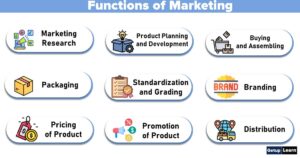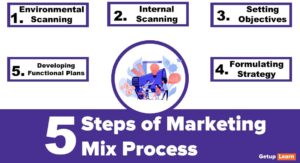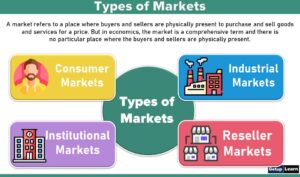Table of Contents
-
1 Benefits of International Marketing
- 1.1 Provides Higher Standard of Living
- 1.2 Optimum Utilization of Resources
- 1.3 Rapid Industrial Growth
- 1.4 Benefits of Comparative Cost
- 1.5 International Cooperation and World Peace
- 1.6 Facilitates Cultural Exchange
- 1.7 Better Utilization of Surplus Production
- 1.8 Availability of Foreign Exchange
- 1.9 Expansion of Tertiary Sector
- 1.10 Some Other Benefits
- 2 Opportunities in International Marketing
- 3 Challenges of International Marketing
- 4 Factors Affecting International Marketing
- 5 Principles of International Marketing
- 6 FAQ Related to Benefits of International Marketing
Benefits of International Marketing
The following are the benefits of international marketing:
- Provides Higher Standard of Living
- Optimum Utilization of Resources
- Rapid Industrial Growth
- Benefits of Comparative Cost
- International Cooperation and World Peace
- Facilitates Cultural Exchange
- Better Utilization of Surplus Production
- Availability of Foreign Exchange
- Expansion of Tertiary Sector
- Some Other Benefits
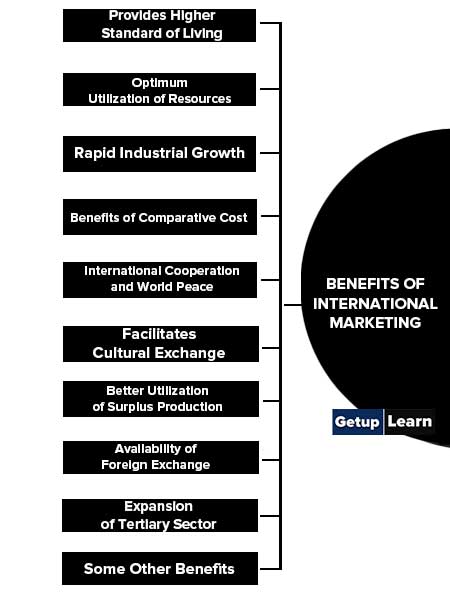
Read More About: ????Importance of International Marketing????
Provides Higher Standard of Living
International marketing ensures a high standard of lifestyle & wealth for citizens of nations participating in international marketing.
Goods that cannot be produced in the home country due to certain geographical restrictions prevailing in the country are produced by countries which have an abundance of raw materials required for production and also have no restrictions imposed towards production.
Optimum Utilization of Resources
Ensures Rational & Optimum Utilization of Resources: Logical allocation of resources & ensuring their best use at the international level is one of the major advantages of international marketing. It invites all the nations to export whatever is available as surplus, for example, raw materials, crude oil, consumer goods & even machinery & services.
Rapid Industrial Growth
Demand for new goods is created through the international market. This leads to growth in the industrial economy. The industrial development of a nation is guided by international marketing. For example, new job opportunities, complete utilization of natural resources, etc.
Benefits of Comparative Cost
International marketing ensures comparative cost benefits to all the participating countries. These countries avail the benefits of division of labour & specialization at the international level through international marketing.
International Cooperation and World Peace
Trade relations established through international marketing bring all the nations closer to one another and give them the chance to sort out their differences through mutual understanding. This also encourages countries to work collaboratively with one another.
This thereby designs a cycle wherein developed countries help developing countries in their developmental activities and this removes economic disparities and technological gaps between the countries.
Facilitates Cultural Exchange
International marketing makes social & cultural exchange possible between different countries of the world. Along with the goods, the current trends and fashion followed in one nation pass to another, thereby developing cultural relations among nations. Thus, cultural integration is achieved at the global level.
Better Utilization of Surplus Production
Goods produced in surplus in one country are shipped to other countries that have the need for the goods in international marketing. Thus, the foreign exchange of products between exporting countries & importing countries meets the needs of each other.
This is only possible if all the participating countries effectively use surplus goods, services, raw materials, etc. In short, the major advantages of international marketing include the effective utilization of surplus domestic production, the introduction of new varieties of goods, improvement in the quality of production & promotion of mutual cooperation among countries.
Availability of Foreign Exchange
International marketing eases the availability of foreign exchange required for importing capital goods, modern technology & many more. Essential imports of items can be sponsored by the foreign exchange earned due to exports.
Expansion of Tertiary Sector
International marketing promotes exports of goods from one country to another encouraging industrial development. Infrastructure facilities are expanded through international marketing. It indirectly facilitates the use of transport, banking, and insurance in a country ensuring additional benefits to the national economy.
Some Other Benefits
Some other benefits at times of emergency: Whenever a rustic faces natural calamities like floods & famines, it’s supported by different countries within the international market. The international market provides emergency offers of products and services to fulfil the pressing necessities of the country facing misfortune.
This distribution will solely be expedited by a rustic that has surplus imports. A company’s mercantilism merchandise to different foreign countries earns substantial profit through export operations as domestic selling is a smaller amount profitable than international selling.
The loss an organization suffers in domestic selling will be remunerated from the profit earned through exports in international selling. Foreign exchange will be earned by mercantilism merchandise to foreign countries.
Opportunities in International Marketing
Following are the opportunities in international marketing:
- Market needs are high and diverse.
- Reaching more customers Consumers have more variety
- Avoiding market saturation
- Outperforming domestic counterparts
- Lowering insolvency risk
Challenges of International Marketing
The following are the challenges of international marketing:
- Awareness of global developments and understanding of diversified and changing consumer attitudes
- Adaptation to market conditions
- Anticipating the actions of global competitors
- Developing new strategies involving Technological innovation, process improvements and creativity.
Factors Affecting International Marketing
It is important at this stage to discuss various factors affecting international marketing. These factors can be divided into two ways:
- Controllable Factors
- Uncontrollable Factors
The controllable factors refer to those variables which are under the control of the company’s management. It includes the control and design of elements of the marketing mix. The company is in a position to control and design products, prices, places and promotions.
All marketing activities relating to these factors can be well controlled and managed by the company’s management. On the other hand, uncontrollable factors are those which are beyond the control of the company. It consists of the total environment in which the marketing mix elements operate.
These are the factors affecting international marketing:
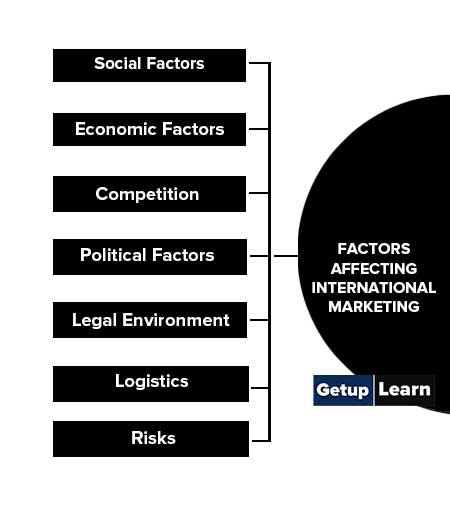
The social factors of a nation determine the value system of the society, which in turn affects the International Marketing Mix. Social factors are culture, caste, customs, languages, lifestyle, the standard of living, climate, marketing infrastructure, etc. The demand for goods and services is affected by all these factors.
There is a lot of change in the quality of lifestyle of the people. They are willing to purchase many consumer durables like TV, fridge, computer, etc., even when they cannot afford to buy them. It became possible because of the availability of a hire purchase system or an instalment basis.
Cultural factors also influence every aspect of International Marketing. International marketing decisions are based on the recognition of the needs and wants of the customers. Cultural factors help to understand the behaviour patterns and lifestyle of the society’s culture, in which the individual has grown up.
Economic Factors
The economic factors are the most significant determinants of International Marketing. They also affect the survival of a business organization and its success.
The economic factors can be studied under the following categories:
- Exim Policy of the Country
- Commercial Policy
- Financial System
- Monetary System
- Currency Restrictions
- Inflation/Deflation.
The decision regarding the international marketing mix is taken by keeping in mind the above-stated economic factors which determine the economic environment of a country. Therefore, before going for an export business or before going for any decision regarding an international marketing mix, it is necessary to examine the economic factors which determine the economic environment of a country.
Competition
Competition is an important determinant of the international marketing mix. The business firm has to face competition in its home market as well as in the international market. The international marketing mix is decided by keeping in mind the strategies of the competitors for the product, price, place and promotion.
Political Factors
The International Marketing Mix is strongly affected by the political environment of the country. A marketer has to operate their business activities under given political factors. Business operations are greatly affected by political constraints at different levels.
The change in the political scenario leads to changes in government policies. Political factors play a major role in deciding the operation of a business organization in international business. Thus, a business organization has to study and analyze the political environment of a particular country, if it has decided to carry out its business operations.
Before going for any decision relating to international business, the business organization has to carry out a SWOT analysis and cost-benefit analysis of the international marketing mix. It must be analyzed keeping in mind the political scenario of a particular country.
The government policy of a country must be assessed, and the role of the private sector and small-scale industry is also important. Finally, it must be analyzed what significant role of the multinational corporation is there in the national economy.
Legal Environment
International marketing decisions are influenced by the legal environment pertaining to competition, price setting, taxation, law, etc. The legal system of a particular country should be studied well before doing business with that country.
Logistics
The International Marketing mix is influenced by Logistics. It includes mode of transportation, cost of transportation, inventory management, material handling and warehousing, etc. It is necessary to study all these factors, before going for any decision regarding the international marketing mix.
Risks
The analysis of the risk factor is an important task to be performed before taking decisions relating to the international marketing mix.
Read More About: ????Future of International Marketing????
Principles of International Marketing
For every business, marketing is considered an integral part where it is all about policies and plans that an organization and individual do to reach out to its predefined customers who are potential enough.
Even it is defined as a process of planning and execution, promotion, distribution, and pricing of services and goods to the desired individuals and organizations. Now the world is becoming an organized global village and the national boundaries are slowly getting vanished
and companies are focusing on the global platform leaving the local markets. Marketing is the art of getting new customers into its fold and retaining old customers as well. Where ever you do marketing may be at the international level or local level the basic principle remains the same
What are the benefits of international marketing?
The following are some benefits of international marketing:
1. Provides a Higher Standard of Living
2. Optimum Utilization of Resources
3. Rapid Industrial Growth
4. Benefits of Comparative Cost
5. International Cooperation and World Peace
6. Facilitates Cultural Exchange
7. Better Utilization of Surplus Production
8. Availability of Foreign Exchange
9. Expansion of Tertiary Sector
10. Some Other Benefits.
What are the opportunities in international marketing?
These are the opportunities in international marketing:
1. Market needs are high and diverse.
2. Reaching more customers Consumers have more variety
3. Avoiding market saturation
4. Outperforming domestic counterparts
5. Lowering insolvency risk.
What are the challenges of international marketing?
These are the challenges of international marketing:
1. Awareness of global developments and understanding of diversified and changing consumer attitudes
2. Adaptation to market conditions
3. Anticipating the actions of global competitors
4. Developing new strategies involving Technological innovation, process improvements and creativity.
What are the factors affecting international marketing?
These are the factors affecting international marketing:
1. Social Factors
2. Economic Factors
3. Competition
4. Political Factors
5. Legal Environment
6. Logistics
7. Risks.



